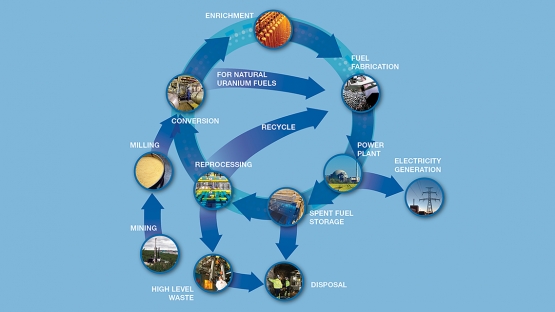The IAEA has released a new e-learning course that supports technical experts worldwide in using tools and methods for nuclear energy scenario modelling, comparative systems evaluation and road mapping towards sustainable nuclear energy. Developed by the IAEA’s International Project on Innovative Nuclear Reactors and Fuel Cycles (INPRO), the course intends to help countries gain a broad understanding of a new INPRO service, Analysis Support for Enhanced Nuclear Energy Sustainability (ASENES).
“The ASENES service supports countries in modelling nuclear energy scenarios,” said Vladimir Kuznetsov of the IAEA’s INPRO Section. “It also makes it possible to evaluate and compare different nuclear energy systems and nuclear energy scenarios and develop roadmaps to strategically plan how to move towards enhanced nuclear energy sustainability.” A nuclear energy system (NES) includes reactors, nuclear fuel cycles, nuclear infrastructure and legal and institutional arrangements.
Nuclear energy sustainability refers to the robustness of the infrastructure, proliferation resistance, waste management, safety, environment and economics in a NES. These are the assessment areas of the INPRO methodology. If an evaluation of these areas shows that a given NES can be manufactured, deployed, operated and decommissioned with a high degree of success in the above six areas, then it can be considered as sustainable.
The e-learning course is targeted to national technical experts working in the areas of nuclear power programme planning, innovative technology development for nuclear power and nuclear energy system analysis and assessment. Experts in government institutions responsible for programmes on nuclear energy development and international cooperation may also benefit.
Users will learn about the functionality of several evaluation tools that resulted from previous INPRO studies and can develop skills to apply them in planning nuclear energy systems with enhanced sustainability. The course offers quizzes at the end of each module for self-assessment and reflection on the learning. The self-contained learning package can also be used as a pre-training element in a comprehensive training programme.
Four main course modules, in addition to an introductory one, correspond to the ASENES service:
- Modelling Nuclear Energy System Deployment Scenarios enables countries to better understand the key issues and find plausible solutions for enhancing nuclear energy sustainability;
- Economic Evaluation of Alternative Nuclear Energy Systems evaluates the competitiveness of different nuclear energy system options;
- Comparative Evaluation of NES and Scenario Alternatives supports the selection of a preferred NES or deployment scenario through a substantive dialogue with decision makers;
- Road Mapping for Enhanced Nuclear Energy Sustainability presents a structured approach for planning nuclear energy sustainability enhancement, allowing users to consider collaboration including nuclear trade among countries at any stage of the nuclear fuel cycle.
As part of a trial implementation of the ASENES service, INPRO conducted pilot courses last year in Mexico and the Russian Federation. Altogether 38 engineers, scientists and ministry experts from 12 Member States reviewed the courses.
INPRO’s ASENES e-learning course is available in the IAEA learning management system. Interested users should register for an IAEA Nucleus account and then contact inpro.elearning@iaea.org to access the course.




